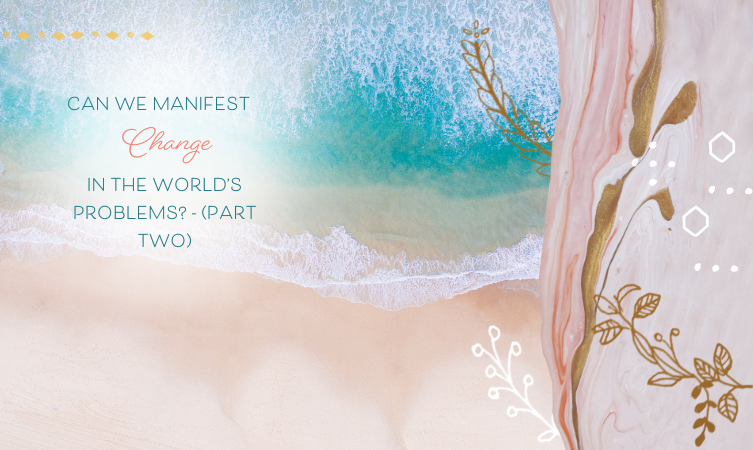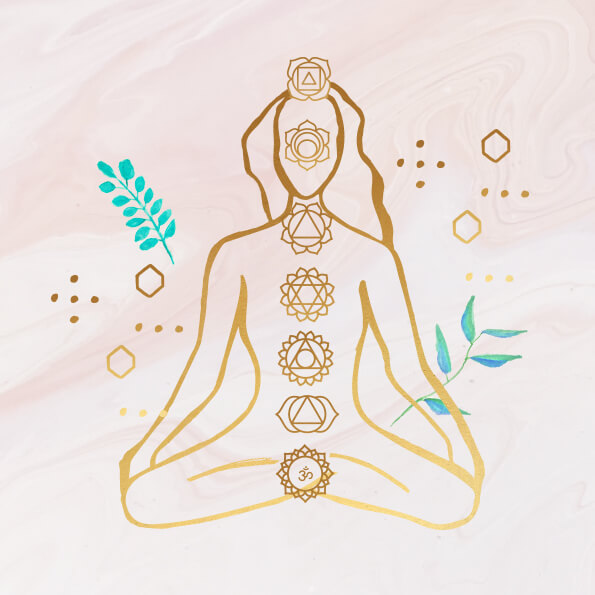
The part 1 article in this series can be found here. In the first article I address the following question: Can we manifest change in global events through where we put our focus?
(If you haven’t already read that article, you might want to go read it before continuing with this one!)
I have a longtime reader who often writes to me with her thoughts and feedback when I send out a newsletter (I’m going to call her “Jenny”, although that is not her name).
Jenny’s feedback to my first article was this: Yes, we can effect change in the world, if we band together through collective prayer and meditation.
This is something that I didn’t talk about in my last article although I will in this one.
I know of theosophy meditation groups in the Alice Bailey tradition who meet monthly on the full moon in an attempt to bring healing energy to Earth. (Maybe someone reading this belongs to such a group.) Joe Dispenza’s and Lynne McTaggart’s students are also doing some amazing work with group meditations.
This has benefits for those who participate. And it’s definitely true that when you meditate or pray in a group, the energy becomes much more powerful.
But on the other hand…
We are all grains of sand on the beach. There are so many of us.
It’s the collective energy of the beach that governs where we’re headed as a planet.
No grain of sand itself is going to change the course of events through conscious creation. You can band together with others in a group meditation and help to raise the energy of this planet but there are also groups that congregate in negative energy and unwittingly counteract that energy.
Does this mean we should lose all hope?
No.
But personally, I don’t feel it’s helpful to concern myself too much with where this planet is headed or wake up in the morning and think about how I can save the world and be a positive influence today.
Instead, I try to take care of my own vibrational state and keep it high, and do my own inner work. When I operate from that place, life unfolds to help me to contribute something that feels positive to me. But I have no idea what role that plays in the scheme of things though and it is not my job to consider it either.
Neville Goddard (the conscious creation teacher who has had the biggest impact on me) knew this.
One of his biggest manifestations is that when he was called up to fight in WW2, he manifested being honourably discharged from the army so that he did not need to fight.
Neville Goddard did not try to manifest an end to World War Two. Instead, he manifested an opportunity to not participate in the war. In doing so, he potentially saved his own life and was able to go on to become a spiritual teacher.
I believe it is more effective to stay in one’s own lane.
Go within and focus on what is right within your own world. This does not mean that you ignore others’ plight — you can still be aware of what is not right with the world, but like the Jesuit priests who survived the Hiroshima bomb, you are more likely to survive and thrive (and be of service to others) if you are living from a high vibrational state, rather than focusing on where the world is headed and what is wrong with it.
Further Resources:
- Ancient Incan wisdom about the times we are living in:








I loved this article. This is another topic I struggle with. I had discovered that I had some ability to create spaces/host events that were highly energetically charged, infused with the intention that attendees feel loved and nurtured, and could interact with one another in a heart centered way. For some reason, this led me to believe that I was now responsible for expanding this talent to serve the entire world. I had envisioned using sound healing, homeopathics, and the amplification of geopathic to remediate Fukushima. I also was wildly interested in “ancient Egyptian technology”, and imagined using it to create outdoor spaces that were inherently healing (think a park you go to that is designed to raise your vibration to one that accelerates healing). And, maybe these interests are just find, and pursuing them fine, too, but what is suspect is the sense of shame, guilty, and sense of responsibility entangled in the MUST.
My point here is that “saving the world” is mostly rooted in manipulative marketing, probably with roots in the Spanish-American war propaganda machine. Guilt and shame are powerful feelings, and much of what we do, who we think we are, and what we believe to be “the right thing to do” is the result of the erosion of our inner authority supplanted by guilt and shame.
“God” also doesn’t need us to do “His” work. God doesn’t need human beings to fight the Devil, or to save the world. Christianity (not Jesus, but the religions that evolved around this figure) then also relies on shame and guilt to fight some adversary. Religious crusaders believe that they too are saving the world. Again, the Creator does not need human beings to save anything.
Saving the world can only be about making someone else wrong. Loving the world, instead, recognizing and celebrating all relationships (which can be as simple as delighting in sitting in a chair that supports you, or appreciating the spider on the wall), brings us closer to tasting our own divinity.
Hi Cloud, Those are some really interesting insights – thanks for sharing!